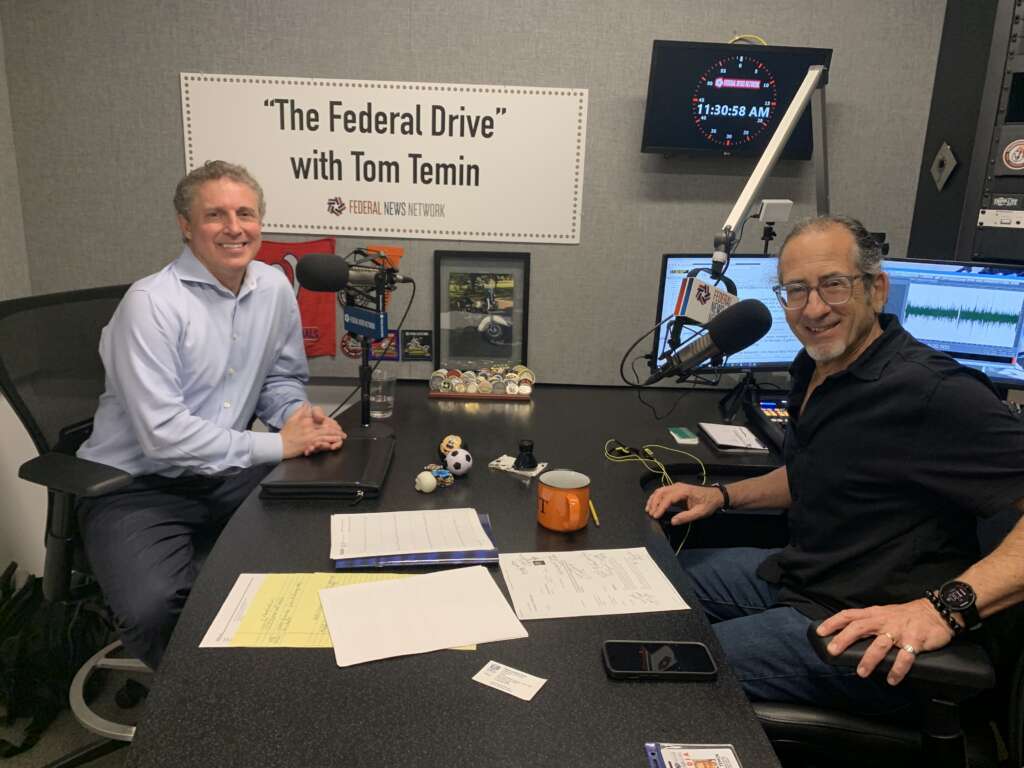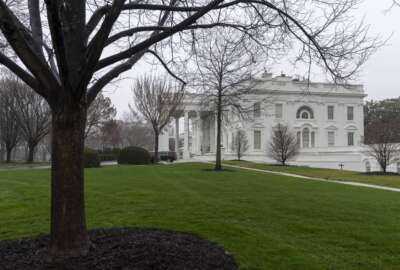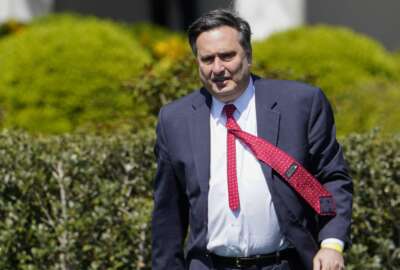There’s a new Hatch Act and whistleblower retaliation sheriff in town
There's a new Hatch Act sheriff in town. Attorney Hampton Dellinger was recently confirmed as Special Counsel, leading the Office of Special Counsel.
With a big and contentious election coming on, there’s a new Hatch Act sheriff in town. Attorney Hampton Dellinger was recently confirmed as Special Counsel, leading the Office of Special Counsel. For some current topics, the Federal Drive with Tom Temin was joined in studio by Hampton Dellinger.

Interview Transcript:
Tom Temin And you are replacing the redoubtable Henry Kerner who has moved on to the Merit Systems Protection Board. But having chatted with you before the interview, you’re no slouch either. Tell us about yourself, where the heck do come from?
Hampton Dellinger Well, mainly from North Carolina. I was born in Mississippi, raised in Durham and Chapel Hill, North Carolina went to University of Michigan for undergrad Yale Law School served as the Deputy Attorney General in North Carolina. I was head of the Office of Legal Policy in the US Justice Department from 21 to 23. And was planning to return to private practice but was asked if I’d be willing to be nominated to head up the Office of Special Counsel. And I’m glad I said yes.
Tom Temin And what have you found there? So far,
Hampton Dellinger I have found an amazingly small agency of incredibly dedicated, talented colleagues, it’s daunting to think about it. And even to say it, we’ve got 2.2 million federal employees. And there are approximately 130, members of the Office of Special Counsel with this incredibly broad mandate, we do enforce the Hatch Act. And we take that very seriously. It’s something that I’ve thought about a lot and have made an announcement about, but we also look to deter government misconduct, and maybe at the core of our mission, protect whistleblowers within the federal workforce, to make sure that they are respected and protected.
Tom Temin And what are your observations, I guess, about the comprehensiveness of whistleblower protection, at least legally in the federal government? Because, you know, every five or six, seven years, there’s a gambit, legislatively to extend protections. And that includes the federal contractor side of it, what’s your sense of how much the blanket covers that bed at this point?
Hampton Dellinger I know there’s more to be done on the legislative side. And that’s something I will think about and talk about in the future. But the law on the books is robust. And obviously, Senator Grassley, the Whistleblower Protection caucus in the Senate have been at the forefront of this effort. But if you look at the protections as written, I think they’re very meaningful, and they ought to give a level of comfort that federal workers who see wrongdoing can speak up and should not and will not be retaliated against. Obviously, it’s up to our office to be vigorous. And we are in making the protections on paper reality. In practice, the Merit Systems Protection Board, obviously, as the Adjudicator plays a key role. And it is wonderful that they now have all three members of the board, we went five years without a quorum. And so those protections, I think, as a practical matter, dipped because the backstop of the MSPB was not functioning as intended. But the MSPB is back. My predecessor Henry Kerner was just sworn in. And he has got incredible experience having been at the Office of Special Counsel and knowing what the law is and how to protect whistleblowers. So, I think there is a lot of protections that are available right now.
Tom Temin All right, and what about on the contractor side in the sense of that?
Hampton Dellinger I have not been able to delve into that or get in the way that I wanted. The first thing I did, Tom, when I got to the agency just a couple months ago, is have one on one individual meetings with every one of my coworkers. So that was wonderful, meaningful, took some time. It also brought home though how small we are the fact that I could do that and have a meaningful meeting with every colleague. So certainly, there is the opportunity for federal government employees to call out misconduct by contractors. But that’s an area I want to spend more time looking into in the near future.
Tom Temin We’re speaking with Hampton Dellinger. He’s special counsel in the Office of Special Counsel. And you mentioned Senator Grassley, this is one area in generally Hatch Act Two, for that matter, that both sides of the aisle so to speak, pretty much come together when it comes to whistleblowers.
Hampton Dellinger You’re exactly right. And that’s part of the attraction for me, you know, at the Justice Department is a nonpartisan agency, the rule of law is what governs when you’re a federal prosecutor, not partisanship. So, I was very comfortable with that. I worked in the state attorney general’s office, we were focused on the rule of law, and not politics. And so, the fact that it’s really a cornerstone of the Office of Special Counsel, that it is above politics, apart from politics, it’s even handed. That’s something that attracted me to the agency and I’ve tried to continue that tradition.
Tom Temin And let’s talk about your recent Hatch Act guidance because everyone is kind of bracing themselves for this election? I don’t even want to say upcoming, because we’re already into the campaign, because the two candidates were decided by the party so early. And because it is, I think it’s fair to say unusually contentious. And there is such a vast contrast between the positions and the candidates. Is there in your sense, maybe a little bit more? I don’t know magnetic attraction to things that would violate the Hatch Act this time around.
Hampton Dellinger Well, I’m sure election years always lead to an uptick in Hatch Act related questions for one. But I do want to make clear, Tom, that my announcement about the Hatch Act was not related to this election was not related to a past president, current president or future president or White House. For me, it was based on coming into the office looking at the law and trying to make sure I was in the agency was following the requirements of the law as closely as possible. So, the major point of the announcement, I think, which is received the most attention is the belief that as it’s written in the law, White House personnel should be subject to the same enforcement scheme as the 2 million other federal workers. And that’s in the statute. So, I’m happy to talk more about it. But I want to make sure there’s no misunderstanding with your audience. This wasn’t about this election, or any politician. This was about me doing my best to try to follow the law.
Tom Temin And when you refer, again, in the announcement to White House personnel, that’s really several types of employees there is the politically appointed Senate confirmed level, then there is a level below that that may not be Senate confirmed. You have the Schedule C; I believe it is people and so on. So, there’s not one type of White House employee.
Hampton Dellinger That’s right. But I want to be clear that the law is written has one carve out, and that is for Senate confirmed right personnel. And actually, as I understand it, I don’t think there’s many if any Senate confirmed personnel who would work in a typical White House, they are in the rest of the throughout the agency. So, for Senate confirmed personnel, Congress has said if my office sees the Hatch Act violation, we should report that to the President. And in that narrow category of presidentially appointed Senate confirmed personnel, the President will decide should there be some type of sanction or punishment for a Hatch Act violation. But for everyone else, the law says my office should take those matters, it has to take those matters that says my office shall take those matters to the Merit Systems Protection Board. So, I understand my office had a different view before I got there. But a lot of that was driven by the lack of a functioning Merit Systems Protection Board. So, for five years, as we said, there wasn’t a quorum, so there wasn’t any place to go. But now the board is back. The law is clear. And I think a level playing field for all federal workers, whether you’re in the west wing or western Kansas, or on the West Coast, is the right thing, and it’s what Congress has said.
Tom Temin Right, so that means functionally, then it’s the same for everybody except that carve out group a complaint is lodged, and then you pursue it through the MSPB. Because there is one.
Hampton Dellinger Exactly, exactly a Congress was very clear. On this point. Again, the case is we’re going to bring, and the office has traditionally actually brought in front of the Merit Systems Protection Board, or the most serious cases, egregious conduct, recidivists conduct, you know, Hatch Act violations over and over again, our office focuses a lot on education and training. We’re trying to prevent Hatch Act violations before they happen. And we’re very focused on that we can issue warning letters, we can ask someone we believe who has violated the Hatch Act to immediately rectify to delete the tweet that may have sought campaign contributions, for example, for a particular candidate. So, we’re looking to do lots of things in addition to taking the most serious cases all the way.
Tom Temin We’re speaking with Hampton del injure, he’s special counsel in the Office of Special Counsel. Well, let’s talk about what constitutes you know, Hatch Act violations. I mean, it gets trivial a button on someone’s lapel, or even I’ve heard over the years, a bumper sticker, you know, that you drive into the federal garage, and then they’re saying people, hey, we’re gonna at lunchtime have a fundraising for candidate XYZ, clearly egregious. And so, tell us about the balance of free speech for government people and this Hatch Act situation.
Hampton Dellinger That’s exactly right. Tom, Congress has said two things and the courts as well have backed up Congress on these points that one, we need to have an apolitical Federal workforce, nonpartisan, and so doing politics on the job at the office is not allowed. And that’s really the core of the Hatch Act. It’s to protect, merit based a political, non-political, Federal workforce. At the same time, federal employees have free speech rights, they have essentially unfettered rights off the job, most of them details@osc.gov, for a couple of caveats, but on the job when it comes to policy matters, who knows better than a government employee about government policy matters. And so Congress and the courts have traded protection so that if you see misconduct if you see law breaking abuse of taxpayer funds, and you’re a government employee, you have those whistleblower protections that we talked about, you always have a right to go to Congress to go to an inspector general to come to my office, the Office of Special Counsel, and even to go to the media to report misconduct. And so, what I tried to make clear in my Hatch Act enforcement update the offices update is that we recognize there’s a balance there. And you don’t want to just pick out a single word that may have had a connection at some point to politics, but now is understood as much if not more in the policy realm and say that words prohibited so we’re looking to create.
Tom Temin Give us an example like Maga.
Hampton Dellinger Maga is one that’s gotten a lot of attention,
Tom Temin or COME ON button or something.
Hampton Dellinger Right? I mean,
Tom Temin come on man, right?
Hampton Dellinger The possibilities are endless. So, the clear, no goes are known as Express advocacy. If you’re on the job, don’t talk about vote for vote against support give to that is clear political advocacy focus on helping to dictate the outcome of an election. And that violates the Hatch Act. But if you’re talking about some policy that you agree or disagree with, that’s not a Hatch Act violation. And I just am trying to say I know the devil can be in the details. And these can be hard closed decisions. But I want federal workers in the public to know that we care about both we care about enforcing the Hatch Act and protecting government employees’ meaningful speech rights.
Tom Temin And it might be a good time to discuss that in the context of when you are not at work. And you may want to help a fundraising drive or a telephone campaign type of thing that is allowable as long as you don’t identify yourself as a federal employee with this or that agency.
Hampton Dellinger Again, in general, I think that’s correct. We have a lot of information@osc.gov. And we are also available, the Hatch Act unit fields, hundreds, if not 1000s of questions, particularly in an election year. So, if anyone has a question about the do’s and don’ts, I would say first start with our website. If in doubt, don’t do it at work, no question. But go to our website, give us a call, send us an email, and we’ll get you a detailed answer. And we’ll try and do it very quickly.
Tom Temin Right. So, someone could be canvassing say, you know, I guess people still do that door to door, probably not a good idea to say, guess what, I work in the civil appellate division of the Justice Department? Would you vote for candidate XYZ? Yet? Or to say I’m Joe Schmo your neighbor? Would you vote for candidate XYZ?
Hampton Dellinger Yeah, Example A sounds like a particularly bad idea. Right.
Tom Temin And we should also review the prohibition against running for office that’s only for partisan office and a lot of local offices. And this has been I think, in the cases over the years, there is no such thing as an actual dog catcher. But that’s the example that’s used elected dog catcher, something that is totally nonpartisan, like the sewer board, you know, or the water Board versus, you know, city council member where it does get partisan.
Hampton Dellinger That’s right. And I know this comes up with some frequency in the DMV. And again, I would ask encourage folks to start with our website. We’ve got folks who’ve been doing this, not just for years, but for decades. I think we’ve essentially seen it all. But I’ve only seen it for a couple months. All right.
Tom Temin Well, I’ll put your I’ll put you on the spot one more time. Sure. What about union officials? That is to say, not employees of the Union, but employees of the agency who are on full time official time. This came up I think the last time around there was a federal employee union official was running for city council in Chicago, highly partisan, but I think he was a person who was full time, official time. So therefore, actually not working at the agency in an agency work, maybe a little bit of a limbo type of person.
Hampton Dellinger Could be and I think there’s an additional layer complexity for union members, which are the collective bargaining agreements, the agreements that some unions have with some agencies. So again, I would say the prudent thing to do is to think about it to check with us before you leap,
Tom Temin and maybe just decide what your priorities in life at some point if you Want to jump into partisan politics? Which is everyone’s right? Well, you gotta give up something perhaps to do that, right.
Hampton Dellinger In particular, if you want to do it during the workday, that’s or if you want to do it during your career. Right, right. But there’s a lot of opportunity. And again, this has been directed by Congress, people have very meaningful partisan political speech and activity rights off the clock, on the clock, they are limited, but at the same time, we want to make sure that government workers understand they do have meaningful, nonpartisan speech rights during the work day, and in particularly for whistleblowers. And that’s the core of our mission, which is making sure that whistleblowers are heard, sure, respected and protected. And if they’re retaliated against, we’re gonna do everything we can to make them whole.
Tom Temin And just before we close, I wanted to get your sense of if you have them yet plans for the agency, there’s 100 people, it’s not going to be 5000 people in the next Congress or anything,
Hampton Dellinger right. 130, though, don’t cut the agency even more.
Tom Temin All right, 130. What do you see as plans for just operational and management priorities for the agency as an agency as an agency head? Sure.
Hampton Dellinger Well, I want us to continue what Henry Kerner really instilled, which is this customer focus. And so, we get, you know, four or 5000 complaints a year. That’s a large number, we want to have meaningful interaction with every complainant with every potential whistleblower, to give them information in a timely fashion and do the best we can with every case. And the cases where we see egregious conduct misconduct, retaliation, I want to use all of our authorities. And now with a fully functioning Merit Systems Protection Board, we’ve got the opportunity to be appropriately aggressive, to be zealous, because that’s our obligation as attorneys, and to really fulfill the mandate from Congress, which is to protect whistleblowers in a meaningful way to enforce the Hatch Act, to make sure government employees have free speech rights. I’m very focused on our obligations to make sure returning members of the military get their federal civilian positions back the law known as USERRA. Sure. And we’re very focused on the Veterans Administration. That’s where we get the greatest number of complaints grew up in North Carolina, we think ourselves as America’s most military friendly state. So, I want to do everything we can for the members of the military and those who serve them at DoD and the VA. And
Tom Temin a final question, are you contemplating some process and technology improvements, just to get things faster? You know, at the MSPB, you find out the occasional case, where there’s 10 years of back pay do, which means the case took 10 years to adjudicate. And of course, they’re working through their backlog amazingly, diligently over and MSPB for that period when there was not a quorum. But for OSC, you know, there’s always processes and backlogs and federal agencies, something like kudzu, you always have to be hacking away at it.
Hampton Dellinger Well, I’d say two things, Tom, I want our website, our public facing information or complaint, portal to be as understandable and accessible and user friendly as possible. And the second thing I’m very focused on is to be as transparent as possible about our work in real time. So we have to do right by the whistleblower, and we have legal obligations to protect whistleblower confidentiality and privacy to the fullest extent possible, and at the direction the whistleblower, but working with the whistleblowers who come to our office, I’m looking for ways and there may be announcements and I’d be delighted to come back when we’re ready to do something publicly about how we can be more transparent in real time about what we’re working on about the concerns had been raised with agencies. So more to come.
Tom Temin Hampton Dellinger is Special Counsel in the Office of Special Counsel; we’d be glad to have you back. But thanks for coming in this time.
Copyright © 2024 Federal News Network. All rights reserved. This website is not intended for users located within the European Economic Area.
Tom Temin is host of the Federal Drive and has been providing insight on federal technology and management issues for more than 30 years.
Follow @tteminWFED






